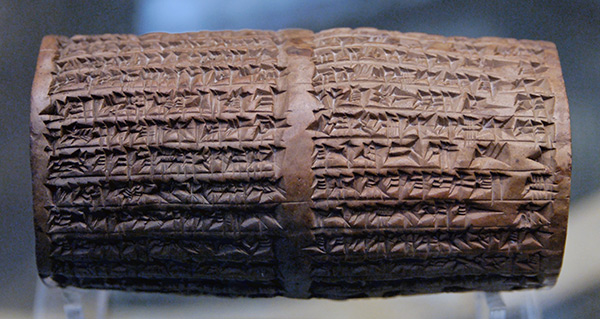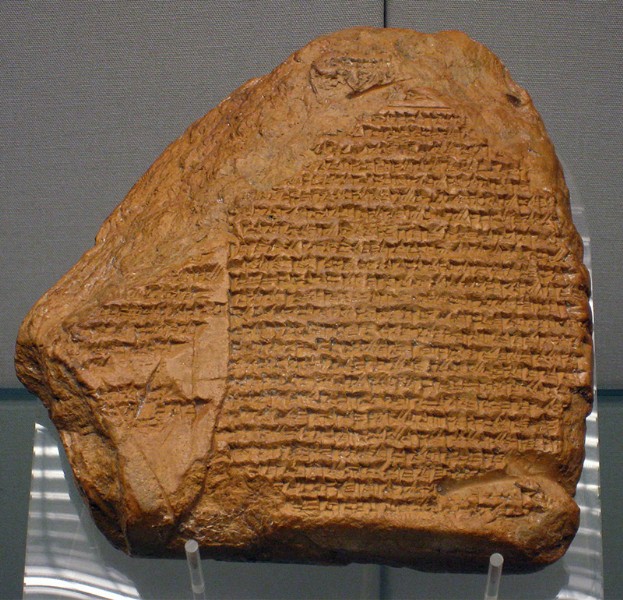With a thousand of his lords in attendance at the feast, Belshazzar, king of Babylon, dusted off the golden goblets that his predecessor Nebuchadnezzar plundered from God’s temple in Jerusalem. Belshazzar and his party guests drank wine from the sanctified vessels “and praised the gods of gold, and of silver, of brass, of iron, of wood, and of stone.” That’s when all heaven broke loose: “In the same hour came forth fingers of a man's hand, and wrote over against the candlestick upon the plaister of the wall of the king's palace: and the king saw the part of the hand that wrote. Then the king's countenance was changed, and his thoughts troubled him, so that the joints of his loins were loosed, and his knees smote one against another. The king cried aloud to bring in the astrologers, the Chaldeans, and the soothsayers. And the king spake, and said to the wise men of Babylon, Whosoever shall read this writing, and shew me the interpretation thereof, shall be clothed with scarlet, and have a chain of gold about his neck, and shall be the third ruler in the kingdom.”
Daniel in the Critics’ Den. Because of the remarkable fulfilled prophecies in Daniel, critics have long tried to cast doubt on its historical reliability. Although Daniel lived in the 6th century BC, scholars want to date the book to the time of the Maccabees—four centuries later. This allows them to say that Daniel’s prophecies were actually written after the events he ‘predicted’. So, it’s no wonder experts commonly assumed Daniel contains significant historical errors, including claims that Belshazzar’s name and story were fabricated by someone unfamiliar with true Babylonian history.
End of an Empire. The Bible presents the famous ‘writing on the wall’ episode as occurring on the same day that the city of Babylon, capital of Babylonia, fell to the Medo-Persian empire under king Cyrus the Great, as per Daniel’s interpretation to the king. The Bible claims Belshazzar fell dead “that very night”, and with his murder the Babylonian kingdom succumbed to the control of Medo-Persia. However, all other known historical records seemed to disagree. Ancient historians (Herodotus, etc.) and a vast number of cuneiform documents were united in claiming Nabonidus as the last king of the Neo-Babylonian empire. Belshazzar remained unmentioned.
 Buried Treasures. But just when it looked like all the evidence undermined the Scriptures, a series of archaeological discoveries showed that Belshazzar did exist after all, and the details given about him in the Bible stand profoundly correct. First, in 1854, four clay cylinders with identical inscriptions were excavated from Ur. These Nabonidus Cylinders (photo, right) contained Nabonidus’ prayer to the moon god for “Belshazzar, the eldest son—my offspring.” Thus, Belshazzar was Nabonidus’ firstborn son and heir to his throne.
Buried Treasures. But just when it looked like all the evidence undermined the Scriptures, a series of archaeological discoveries showed that Belshazzar did exist after all, and the details given about him in the Bible stand profoundly correct. First, in 1854, four clay cylinders with identical inscriptions were excavated from Ur. These Nabonidus Cylinders (photo, right) contained Nabonidus’ prayer to the moon god for “Belshazzar, the eldest son—my offspring.” Thus, Belshazzar was Nabonidus’ firstborn son and heir to his throne.
 Then, in 1882, a translation of another ancient cuneiform text, the Nabonidus Chronicle (photo, left), revealed Nabonidus as an absentee king, spending 10 years of his 17-year reign living in Tema, Arabia (450 miles away from Babylon). The king left Belshazzar, whom the text calls “the crown prince”, to take care of affairs in Babylon during that time. Also, the Chronicle explained that Nabonidus departed Babylon before it fell. Two days earlier he fled from the Persians after they defeated him at Sippar, so Belshazzar held the highest office in Babylon at the time of its capture. Next, the Persian Verse Account of Nabonidus, published in 1924, stated that, as “he started out for a long journey”, Nabonidus “entrusted the kingship” to “his oldest (son), the firstborn.” Belshazzar clearly served as king for years while his father stayed away.
Then, in 1882, a translation of another ancient cuneiform text, the Nabonidus Chronicle (photo, left), revealed Nabonidus as an absentee king, spending 10 years of his 17-year reign living in Tema, Arabia (450 miles away from Babylon). The king left Belshazzar, whom the text calls “the crown prince”, to take care of affairs in Babylon during that time. Also, the Chronicle explained that Nabonidus departed Babylon before it fell. Two days earlier he fled from the Persians after they defeated him at Sippar, so Belshazzar held the highest office in Babylon at the time of its capture. Next, the Persian Verse Account of Nabonidus, published in 1924, stated that, as “he started out for a long journey”, Nabonidus “entrusted the kingship” to “his oldest (son), the firstborn.” Belshazzar clearly served as king for years while his father stayed away.
Strange Offer. Remarkably, this also sheds light on a small detail in the Bible —why king Belshazzar only offered the third highest position in the kingdom. Since Nabonidus remained alive until even after Babylon fell, this means that Belshazzar ruled like a co-regent, officiating at the same time as, and under the authority of, his father. So Nabonidus held in the ‘number one’ position, while Belshazzar took second place. This explains why Belshazzar could not offer to Daniel the second spot; third place was the highest available office!
Unbeatable Book. The fact of Daniel’s historical accuracy—even down to what once seemed an insignificant detail—shows he wrote near that narrow window of time. Daniel remains right to this day and, as archaeology has shown, possessed a better understanding of Belshazzar and his actual role in Babylon than the critics!
Condensed from Keaton Halley, Creation.com, July 2015
Like this? Consider sharing it to Facebook by clicking the linked icon below.
